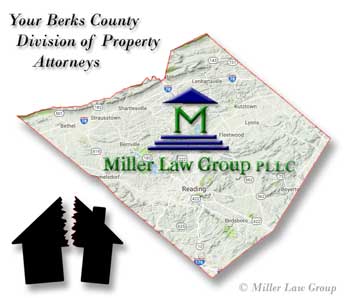Berks County Business Law, Family Law and Estate Planning Attorneys
Berks County, Pennsylvania Division of Property Attorneys Near Reading

Family Law Attorneys at The Miller Law Group, PLLC

Family Law
Our Attorneys are proven, experienced Berks County Family Law Specialists.

Divorce
Our expert Divorce Attorneys will help you decide which options are best for you based on 40 years' experience practicing PA Divorce Law in Berks County.

Division of Property
Our experienced Property Division Attorneys will make sure you get the best Equitable Distribution of Marital Property.

Spousal Support / Alimony
We'll make sure you have money to live will you're separated, to defend yourself in your divorce and to secure your long-term financial well-being.

Child Custody
Like you, our Child Custody Attorneys put the children's well-being first while protecting your rights to be with them.

Child Support
Like you, our Child Support Attorneys put the children's well-being first while protecting your rights to be with them.

Grandparents' Rights
We'll defend grandparents' rights to see their grandchildren and parents' rights to control who spends time with their children.

If there was any doubt in your mind about needing an experienced, expert divorce lawyer there won't be after you read this section.
- Pennsylvania is a Marital Property State.
- Marital Property includes:
- assets acquired from the date you got married to your Separation Date (the date you separated from your spouse); plus
- the increase in value of certain non-marital property in that time period. Examples of Marital Property include:
- Real Estate;
- Stocks and Bonds;
- Bank Accounts;
- Cars;
- Boats;
- Deferred Compensation;
- Pensions and 401k's;
- Cash Value of Life Insurance Policies;
- Home Furnishings;
- Memorabilia;
- Electronics;
- Art;
- Antiques;
- Horses;
- Pets;
- Wine Collections;
- Cemetery Plots and Prepaid Funeral Arrangments;
- Rare Coins;
- Stamp Collections;
- Intellectual Property;
- Retained Earnings from a Business Owned by Either Spouse;
- Memberships;
- Classic Cars; and
- Anything Else of Value.
The list is not all-inclusive but is meant to help you think of the types of things to include in Marital Property.
- Marital Property usually excludes:
- property acquired by gift;
- property acquired by inheritance;
- premarital property; and
- property excluded by a prenuptial agreement.
- Marital Property is either divided by: (a) an agreement you make with your spouse or, if an agreement is not possible; (b) through the divorce court.
- The preferred method is to negotiate with your spouse keeping the division of Marital Assets out of court. You need an experienced divorce attorney to guide you through this negotiation so you totally understand the ramifications of the agreement and protect your share of the Marital Property.
- If no agreement is possible the divorce court will decide how assets are divided based on the principal of Equitable Division.
- The goal of Equitable Division is not the 50/50 distribution of assets. Theoretically the split could be between 0/100 to 100/0.
- The court does not consider marital misconduct in determining the distribution of Marital Assets.
- The court uses 11 subjective guidelines in determining fair and equitable distribution of assets. Here's a direct excerpt from § 3502 of the Pennsylvania Divorce Code:
Factors which are relevant to the equitable division of marital property include the following:
(1) The length of the marriage.
(2) Any prior marriage of either party.
(3) The age, health, station, amount and sources of income, vocational skills, employ ability, estate, liabilities and needs of each of the parties.
(4) The contribution by one party to the education, training or increased earning power of the other party.
(5) The opportunity of each party for future acquisitions of capital assets and income.
(6) The sources of income of both parties, including, but not limited to, medical, retirement, insurance or other benefits.
(7) The contribution or dissipation of each party in the acquisition, preservation, depreciation or appreciation of the marital property, including the contribution of a party as homemaker.
(8) The value of the property set apart to each party.
(9) The standard of living of the parties established during the marriage.
(10) The economic circumstances of each party at the time the division of property is to become effective.
(10.1) The Federal, State and local tax ramifications associated with each asset to be divided, distributed or assigned, which ramifications need not be immediate and certain.
(10.2) The expense of sale, transfer or liquidation associated with a particular asset, which expense need not be immediate and certain.
(11) Whether the party will be serving as the custodian of any dependent minor children.
Miller Law Group PLLC
Family Law, Business Law and Estate Planning Attorneys
25 Stevens Ave West Lawn, PA 19609
Monday - Friday 9:00 a.m. to 5:30 p.m. EST
Call 610-670-9000
Email: brandy@millerlawgroup.net
Our Berks County Law Offices are Located in West Lawn, PA Near Reading.